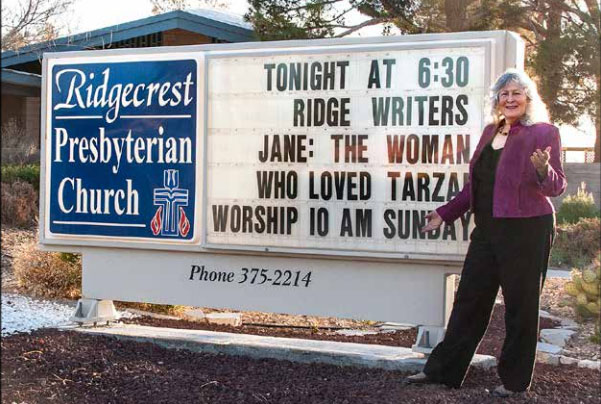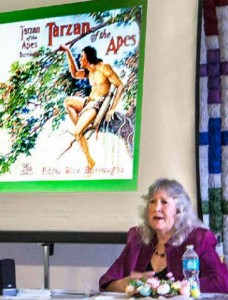
Review by Margaret Leubs for the Newsletter Purple Sage of the Eash Sierra Branch, California Writers Club
Robin Maxwell introduced herself to the Ridge Writers by explaining that she too was a desert denizen, as she and her husband run a bed and breakfast near Yucca Valley.
She then told us how she came to be interested in both Tarzan and Jane. Tarzan was her first heartthrob, a gorgeously muscled he-man, living free. The romantic in her loved that he loved an American girl.
She also enjoyed other comics, such as Superman, but no super-hero could hold a candle to Tarzan. She never actually read Edgar Rice Burroughs’ novels, but she did love the movies based on them.
Life went on, and she forgot all about Tarzan for decades – until the movie “Greystoke” came out. The second half of the movie left her cold, because in that movie Jane never gets to the jungle. But the first half reminded Maxwell of her early love for the character of Tarzan.
Maxwell has been writing historical novels for over 15 years. Three years ago, after finishing O Juliet, she began to wonder what her next book would be about. Maybe more literary lovers? That made her think of Tarzan and Jane, though her husband was dubious.
She had two friends who were already working with the Edgar Rice Burroughs estate for another project, and from them she learned that Burroughs had written a total of 24 Tarzan novels and that the estate would expect her to treat him well. So she read the first novel and was blown away by Burroughs’ storytelling ability.
When she spoke to the president of Edgar Rice Burroughs, Inc., Jim Sullos, he told her that the estate hadn’t authorized a new Tarzan novel in 30 years. Then she told him her idea – Tarzan from Jane’s point of view – and three seconds later he said he loved the idea. He also told her that 2012 was the 100th anniversary of the first published novel, so her timing was good.
Then she had to come up with a detailed outline for Jim to pitch to the board of directors. This required a great deal of research, as is typical for Maxwell when she writes historical fiction. The right books always seem to fall into her lap, she said.
She read about the rape of Africa, chimpanzees and gorillas, feral children, the “missing link” in human evolution, and Edwardian women. Google Earth was a favorite tool, and YouTube turns out to be very good for seeing places that you can’t manage to visit in person.
Then she watched the films. She couldn’t get the early silent Tarzans, but did watch the Weissmuller films. The first two are very sensual, and the second, made in 1934, contains a nude swimming scene that caused the Hayes Code to be strengthened.
The more Maxwell read, the more the story came into focus. She knew that the story had to be fresh and relevant. Sensibilities have changed since Edgar Rice Burroughs wrote the original books. Seventy percent of readers today are women (though in fact, Jane has slightly moreRobin Maxwell shows Ridge Writers the cover of Edgar Rice Burroughs’ original Tarzan book. Photo by Lizmale than female readers). Maxwell was determined that her Jane would be forward thinking and well-educated. She also wanted a kindler, gentler Tarzan, not as quick to kill animals or taunt local tribesmen. Through trauma he had forgotten who he was and would find himself through the love of a woman.
Maxwell wanted every part of her story to be grounded in reality, unlike the original story, which was more of a fantasy. Her Jane was a tomboy, the only child of a professor and amateur paleoanthropologist. Maxwell’s story differs from the original in several other ways as well.
First, Maxwell’s Jane and her father are not part of a treasure-hunting expedition, but rather are searching for “missing link” fossils. Instead, they find a “missing link” tribe – the Mangani who brought Tarzan up.
Second, Maxwell’s Tarzan was taken from his parents at age four, not one, so that he was able to speak and even read and write a little, which made his later ability to learn language more probable. The Burroughs estate did not likethat change, but she insisted on it.

Our speaker, Robin Maxwell, poses with the announcement of her talk that our hosts at Ridgecrest Presbyterian Church graciously put on the church’s streetside sign. Thank you, Ridgecrest Presbyterian!
Third, the original Jane is accompanied by a black maid (a “Mammy” type character) and is always civilized. But Maxwell wanted her Jane to have a character arc and wanted her to be alone with Tarzan for long periods of time.
Fourth, Tarzan and Jane have a love affair, in the fullest sense of the term. This was a major violation of the Burroughs estate rules, but Maxwell managed to get their rule changed in her contract, agreeing only that the sex would be tasteful.
Maxwell pitched her story to Jim Sullos for five solid hours, after which he had to convince the board of directors. She waited a month, during which time she did no work on the book. Finally she got the go-ahead.
Her next job was to do the detailed plotting, including how to get Tarzan and Jane to “meet cute.” The estate began sending her images of Tarzan and Jane, and she was put in touch with a Tarzan illustrator, Thomas Yates, who sent her many of his illustrations.
Her agent found her a home with Tor Books (a division of Macmillan), and there was a bidding war for the audio book. In March of last year, Maxwell spoke at a major Tarzan and comics convention. She met Jane Goodall, who had always been a Tarzan fan. Goodall read Jane, loved it, and agreed to endorse it, which was a major coup.
Maxwell noted that authors are often warned not to fall in love with their characters, but she thinks that’s hogwash. She said she is profoundly grateful for Edgar Rice Burroughs’ magnificent creation. As a finale to her program, she showed a montage of pictures of Tarzan and Jane through the years, set to music.
Afterwards she took a few questions. One person asked whether she is writing a script of her novel, since she was originally a screenwriter.
Unfortunately, Warner Brothers has a Tarzan project that has been in production for six years, possibly a series. So Maxwell has to be patient. She submitted a treatment of her book to Warner Bros., and asked them not to “step on Jane’s toes” in their movie.
Maybe her book could be a prequel. Or maybe a TV series. I certainly hope to see Robin Maxwell’s vision of Jane on the screen sometime soon.
The above excellent report on our April meeting is a good example of Margaret Luebs’ generous-spirited contributions to our branch. Margaret, who is the mother of very active twins, could still always be counted on to volunteer her writing skills on behalf of our branch. Even as she was packing to depart for Colorado Springs, Margaret left us this last report – and two gifts – two more articles to run in upcoming issues! Margaret, we will miss you. – ed.







